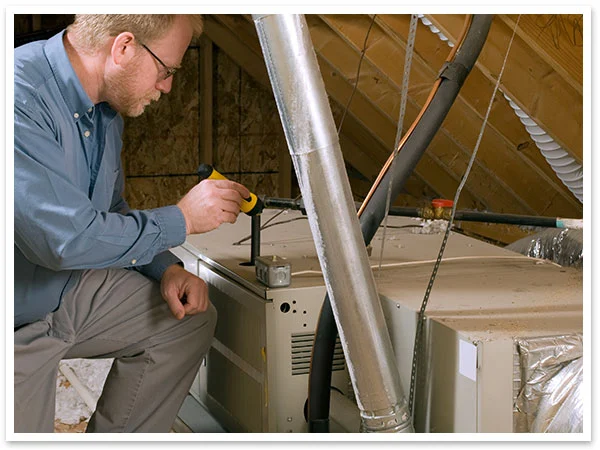Frequently Asked Questions About Heating Repairs & Services

When it comes to heating services or furnace repairs, you have questions & we have answers…
Is it OK for refrigerant (FREON) to come out of my heat pump?
It is never acceptable for refrigerant to leak from your air conditioning unit or heat pump. Refrigerant cycles in a closed loop system and is never supposed to evaporate, dissipate or get used up. Adding refrigerant to your unit indicates that you have a leak which can damage your system if not resolved in a timely manner. Also, most refrigerant has chemical properties that are harmful to the environment if released into the atmosphere.
What is an HVAC leak search and why do they differ between companies?
A leak search is a service procedure that is necessary when it has been determined that the system has a refrigerant leak. While some companies may perform this leak search by applying soap bubbles to the system, the only truly effective method of locating a refrigerant leak is through the use of an electronic leak detector. These detection systems are highly sensitive and are capable of detecting the smallest of leaks.
What can I do to protect my unit and how can I keep it clean?
Trim plants and bushes around the unit to provide at least twelve (12) inches of clearance for air flow. Keep pets away from the outdoor unit, as the acid in pet urine is a corrosive that will deteriorate the metal. Have the unit services annually to maintain cleanliness and ensure proper air flow.
Just how important is my filter?
Good airflow is critical to the efficient operation of any air conditioning system. A clean, high efficient air filter will also protect the system from the harmful effect of dirt buildup on the vital components of the air handler or furnace. A high quality air filtration system also provides for cleaner air in your home and ensures a higher level of comfort for you and your family.
What is happening when I see ice on my unit?
You may see “frost” or “ice” on the outdoor unit because the coil of the heat pump is colder that the air surrounding it and when that air is below freezing, frost or icing will occur, but should melt within 90 minutes as this is the timing sequence most defrost controls use to check for this condition in our area.
What is carbon monoxide?
Carbon monoxide (CO) is a colorless, odorless and toxic gas. The Environmental Protection Agency warns that at low levels of exposure, CO causes mild effects that are often mistaken for the flu. These symptoms include headaches, dizziness, disorientation, nausea, and fatigue. Many online resources and fact sheets are available to answer questions about carbon monoxide.
The U.S. Consumer Product Safety Commission (CPSC) recommends that every home should have a carbon monoxide (CO) alarm. The CO detector will audibly alert the homeowner to the danger of the unacceptable CO level. For more information on Carbon Monoxide, click on the following links: www.cdc.gov/co/faqs.htm www.epa.gov/iaq/co.html
What do I do if I smell gas?
Evacuate yourself and any other persons/pets from inside the home immediately. Using a phone located outside the home, call your local gas utility and/or the fire department.
I have a heat pump and my electric bill was high. What could this mean?
If the electric rates haven’t increased during that time period and you aren’t experiencing a colder than normal winter, this could indicate a problem with your system. Contained within the air handler on your heat pump system is a set of electric heaters that serve as a backup to your outdoor unit during the winter months. If the outdoor unit isn’t working properly, the electric heaters will run more frequently in order to meet the heating demand of the home. There are also controls involved with the operation of the electric heaters that may be malfunctioning and allowing the heaters to remain on even though there is no requirement for their operation. These problems may only be diagnosed by a properly trained and qualified HVAC Service Technician.
Why should I have my gas furnace checked annually?
The Environmental Protection Agency states that it is most important to be sure combustion equipment is maintained and properly adjusted, and recommends to “have a trained professional inspect, clean and tune-up central heating systems annually, and repair any leaks promptly”. Further, the U.S. Consumer Product Safety Commission (CPSC) “urges consumers to have a professional inspection of all fuel-burning appliances to include furnaces and water heaters.”
Services
The Best
Excellence, efficiency, and an enduring spirit of service are three of the core values that keep our customers coming back. Our customers’ reviews explain the F.H. Furr difference better than we ever could.
At F.H. Furr, we take pride in hiring “Absolutely The Best” technicians. But don’t just take our word for it — read the rave reviews from our satisfied customers and find out why Baltimore trusts our team with all their HVAC, plumbing, and electrical needs.


